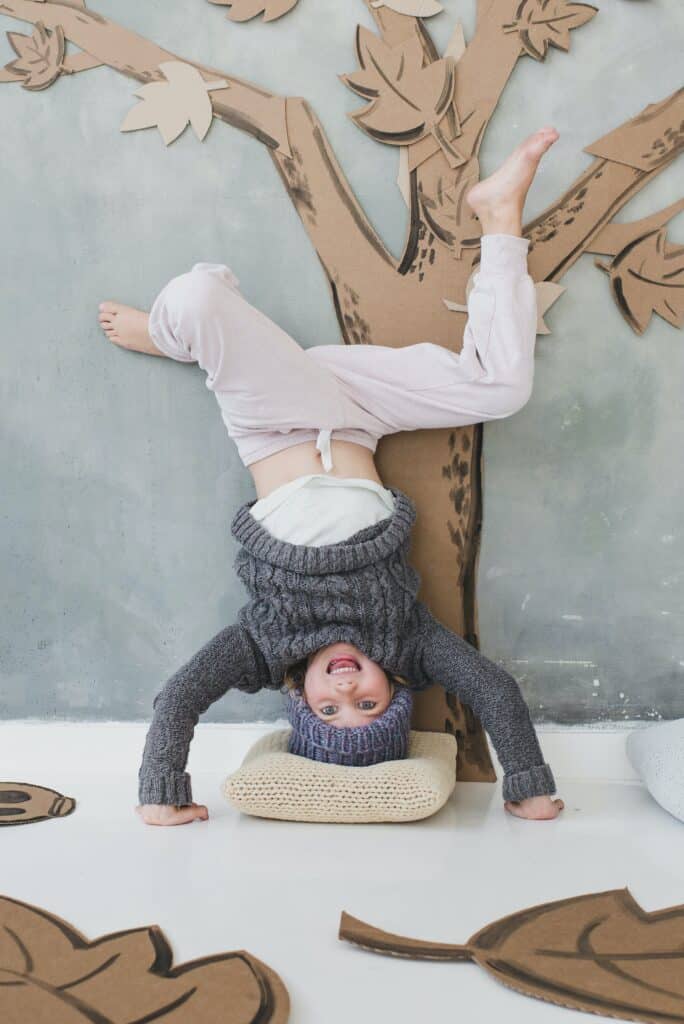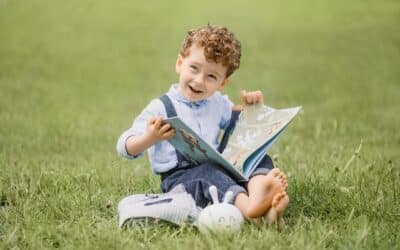Social play for toddlers supports the social, emotional, and cognitive development of a toddler. In this guide I’ll take you through examples of social play for toddlers that we used with our toddler Nina.
If you are new to the concept of social play then you may find our guide to social play for young children worth a read.
If you are short on ideas and examples for social play this guide will take you through examples we enjoyed with our toddler.
Social play provides a dynamic way to interact with your toddler in a fun and engaging way. During social play, your toddler will not only have fun but will develop their understanding of themselves, others and the world around them.
Effective social play will expose your toddler to social situations where they are exposed to friendship, cooperation, conflict resolution and empathy. These play situations all work to provide positive development for the toddler, as well as being lots of fun for the parent and building on the parent-toddler bond.
In this guide, we provide a selection of social play ideas and actionable examples. We hope you’ll also benefit from our guidance on how to implement each example. From setting up engaging play environments for your toddler to selecting activities that encourage interaction and cooperation by the toddler.
Understanding Social Play
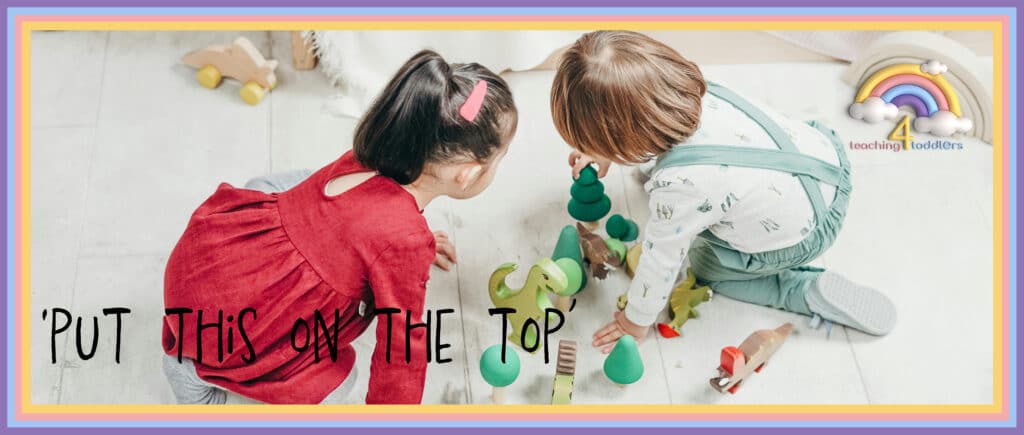
An understanding of social play helps a parent, or carer, in making the most of social play with the toddler. Let’s take a minute to remind ourselves that at its core social play involves interactions between the toddler and other people. Those people may be other toddlers or grown-ups.
Social play is characterised by its reciprocal nature. A toddler is actively encouraged to communicate, share and respond positively to others involved in the play. This ‘reciprocal’ characteristic is what facilitates the development of social concepts such as sharing.
This type of play is important in the early stages of helping a toddler understand social norms and develop their interpersonal skills
The Benefits of Social Play
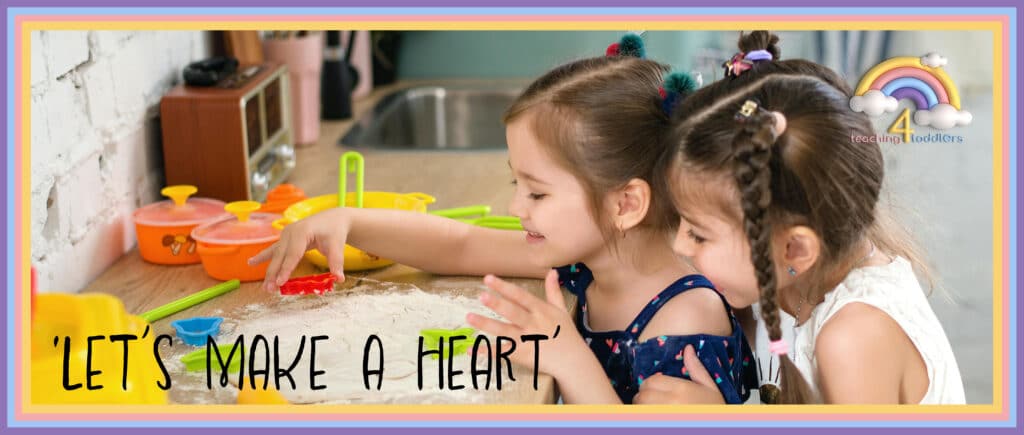
Before we dive into our selection of social play ideas and examples for toddlers let’s consider the benefits of social play.
The benefits of social play are varied and encompass several areas of toddler development:
- Social Skills: Through social play toddlers learn to communicate their ideas as well as to listen to others, and to engage positively with others.
- Emotional Intelligence: Social play assists a toddler in expressing and managing their emotions, as well as understanding the emotions of others.
- Cognitive Development: Directed social play promotes a toddler’s problem-solving skills, and fosters creativity, and cognitive flexibility in a toddler.
- Language Skills: The interactive nature of social play encourages the development of the toddler’s language skills, and helps in expanding their vocabulary.
- Physical Development: Social play can incorporate physical activities which help to develop a toddler’s motor skills, and coordination, and improve their physical development.
Take a moment to reflect on the benefits of social play for your toddler. This will help you in making the most of the social playtime.
Keep in mind that as well as aiming to provide a fun experience for the toddler the activity should be geared towards their positive development.
To effectively achieve this you will need to actively participate in the play situation. Social play works best when it forms part of a directed learning experience led by the parent.
The examples below provide practical ways to implement social play among toddlers.
Examples of Social Play Activities
The example below of social play activities is intended to provide practical ideas that you can implement, both within the home and outdoors.
Dramatic/Role Play Social Play
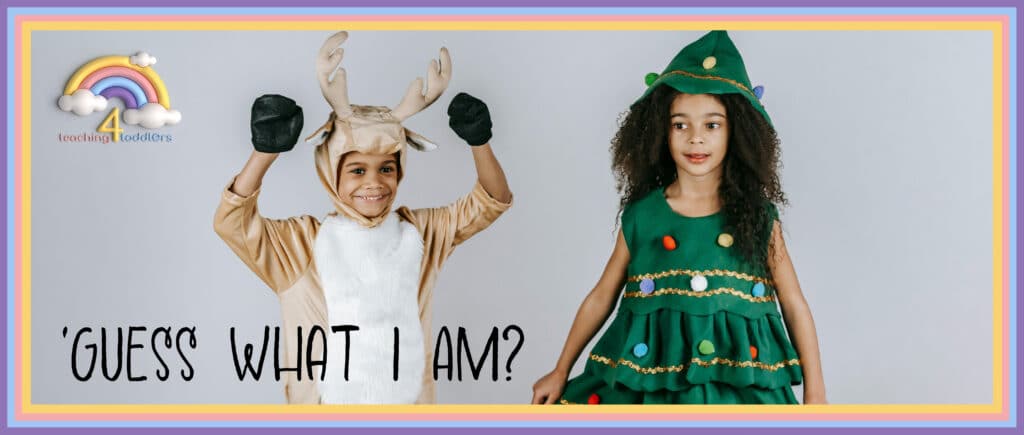
Most parents will be aware that their toddler loves to engage in role-play. Role play comes naturally to a toddler and is one of the ways that they ‘figure out’ the world around them.
Toddlers love to mimic scenarios, environments and situations that they observe around them. With this in mind, you’ll find that toddlers enjoy social play scenarios based on situations that they have had a lot of exposure to.
Keep in mind that toddlers love to use their imagination. If you have physical props around then use them. If not create them. We found that our daughter was just as excited to play coffee shop owner with a plastic coffee cup as she was with one we drew and cut out of card.
Shop Keeper Social Play
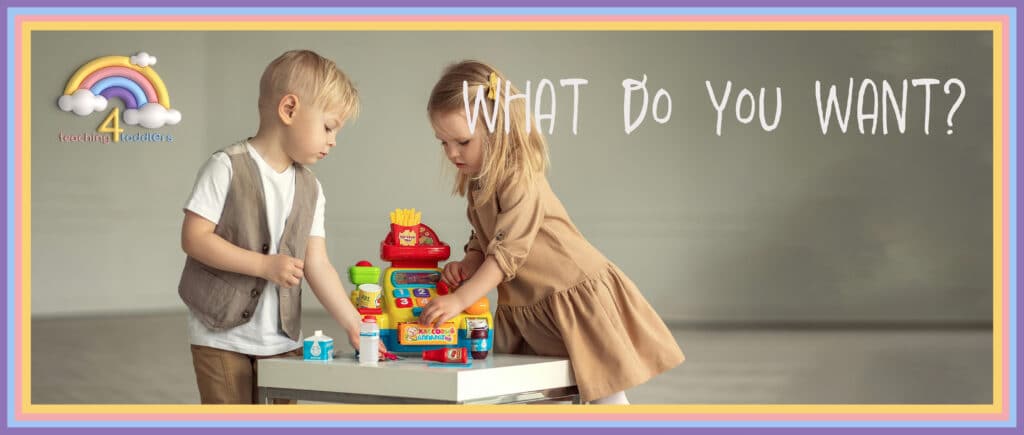
A firm favourite with all toddlers, both boys and girls. From their early years, almost all toddlers will have regularly accompanied their parents to the shops.
Reenacting the shopkeeper/customer element will provide great entertainment and social development opportunities.
Implementing Shop Keeper Play:
- Take some time to set out the environment. Use a cardboard or plastic box, or another suitable item, to create the counter between the shopkeeper and the customer.
- Depending on the type of shopper experience you are creating collect together, or create, some relevant props. This could include coffee cups, milk and sugar for the coffee shop scenario. As we said above, our experience was that our toddler enjoyed using cardboard cut out of these items, just as much as the plastic versions from ses we bought.
- Allocate roles. One party will be the shopkeeper and the other, or others the customer. Keep it simple. Your toddler will enjoy simply ordering a coffee and watching you pour imaginary coffee from a put into a cup, then ask if they would like milk or sugar. Take time to stir the milk, and or, sugar (this works the cognitive and fine motor skills).
- Introduce numbers. For toddler toddlers (2 to 3 year olds) you can begin to introduce numbers into the role pay scenario. For example, you may ask for two coffees to be made, or ask for three cubes of sugar to be added. Adding a payment section to the d of the role-play scenario is also a great way to introduce numbers. Ask the toddler how much you have to pay for the coffee, or other shopping, once they have made it, or put it in your bag. Count out real, plastic or imaginary coins to make payment.
- Switch roles. When practising social play the toddler must experience both sides of the situation. This will help develop their understanding of roles, as well as enhance the fun of the social play experience.
The shopkeeper example of social play is an excellent choice because it can be implemented with multiple toddlers and assigning each their role.
This example of social play role-play is also great because you can vary the type of ‘shopper’ scenario. For example, your toddler will love:
– Icecream seller
– Pizza shop
– Bakery shop
– Cake shop
Have fun experimenting with a range of scenarios.
Cooking and mealtime Play
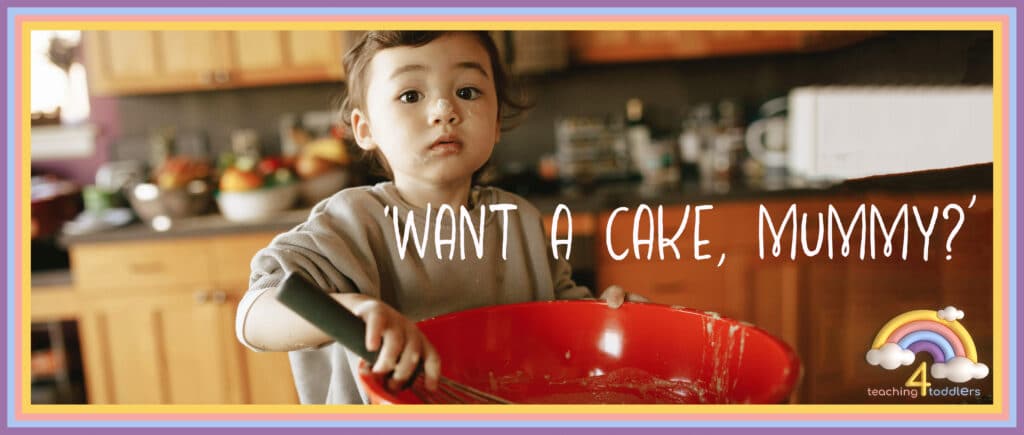
Toddlers enjoy taking on roles that they regularly observe within a family environment. Cooking and preparing a meal is another favourite for toddlers. It mimics a scenario that they most likely see every day within the home.
The toddler will enjoy playing with cooking as well as setting out the plate and watching you pretend to eat it before you compliment them on how delicious it is.
Implementing the Cooking scenario:
- Set up your kitchen and eating table environment. We don’t recommend using the actual oven, or hob. If you have a play kitchen set then great, but if you don’t then have fun making one. You can draw a hob on a large piece of card or paper. Trust us, your toddler will love placing their cardboard bowl on it and mixing it with a wooden spoon just as much as they will enjoy playing with plastic, or wooden, props that you have bought.
- Split the play up into two stages. First is preparing and cooking the food. Second is putting it onto plas and last is eating it.
- Introduce descriptions. We found the cooking play scenario to be a great opportunity to direct descriptive communication with the toddler. Ask them to describe what they are doing at each stage. Of course finish by asking them how he mal was and to say what they like bst about it. It’s amazing how a toddler’s imagination will run when presented with such questions.
- Tidy up. We enjoyed expanding the role-play session to include a selection where we all ‘wash the dishes’ together. No water is needed! Your toddler will enjoy imagining water and rubbing a tea cloth over their real or imaginary props.
The cooking and mealtime social play example can be implemented between toddlers, or between toddlers and parents. We found that this example worked better as a parent/toddler role-play example.
At the Doctors
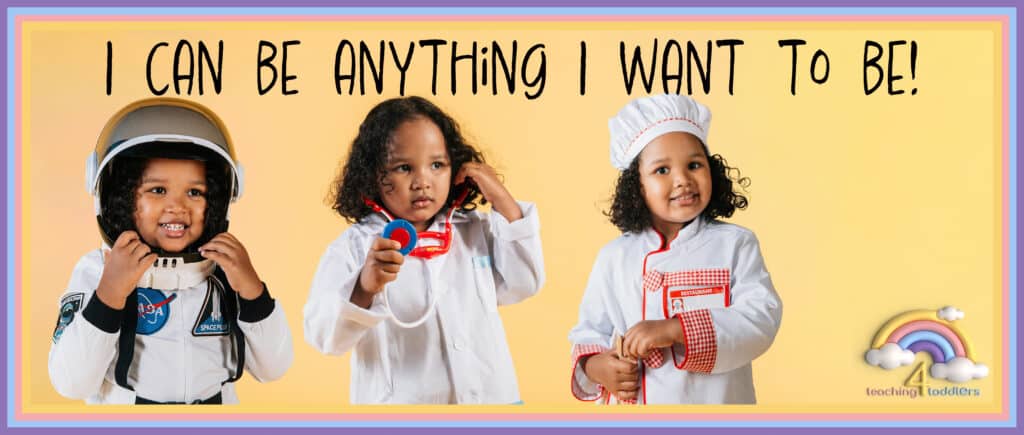
In their early years, a toddler will have experienced many trips to the doctor. Hopefully, just to receive their check-up and immunity jabs.
This social play scenario can be enhanced by introducing dressing up. Your toddler will love putting on their ‘doctor’s coat and stethoscope when they play the role of the doctor.
Of course, as always you can make your props.
Again, we found that our daughter enjoyed using cardboard cutouts just as much as she enjoyed the doctor’s kit that we bought her from Amazon.
Check out the doctor’s printable pack at lifelonglearners.com.
Implementing the Doctors’ Social Play Example:
- Set up a space that will represent the doctors surgery. Adding a few props will assist the toddler in using their imagination to place them in the doctor scenario.
- Allocate roles. If more than one toddler is participating in this scenario consider the roles of doctor, nurse and patient.
- Establish the scenario. Popular scenarios include ‘I’ve hurt my arm’ or my leg. Have fun bandaging the arm or leg.
This scenario works great with a small set of stickers. Toddlers love stickers! The brave patient gets a sticker after treatment.
As with the above examples of social play the activity will benefit from the parent taking an active role. At this early toddler age directed play helps maintain the structure and momentum of the activity.
Tips for making the most of the above role-play scenarios.
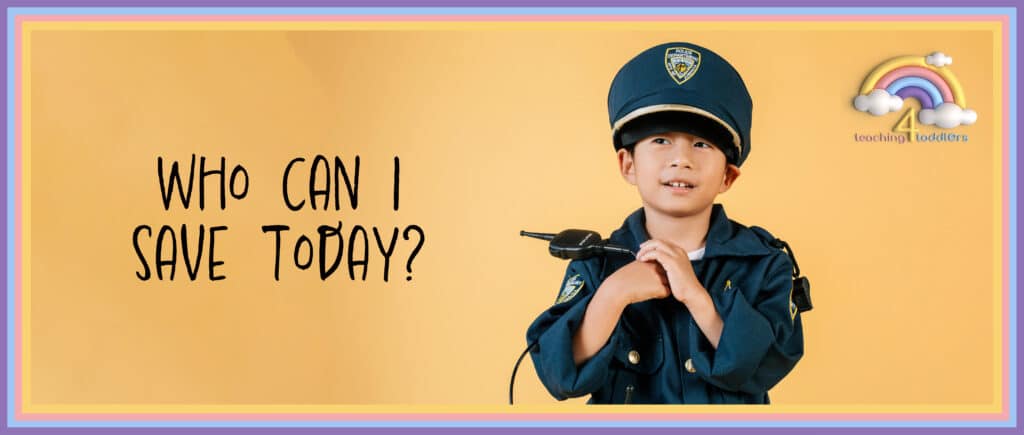
Our own experience was that taking a little time to plan the play scenario led to far more effective play sessions.
The following tips will help you make the most of your toddlers social play time:
Prepare the Environment: you will find that your toddler’s imagination is quite capable of imagining the entire environment and all the required props, costumes, and designated spaces. However, taking some time to create and place a few props, and consider costumes, within the space will help the toddler emerge themselves in the scenario.
Active engagement. Active participation and direction from the parent will assist the toddler(s) in maintaining focus on the play scenario. Once the toddlers are familiar with the play scenario encourage the toddlers to play out the scenario themselves. Social play should not be seen as a ‘set and forget’ activity. Keep in mind that the purpose of this social play is positive development for the toddler. That will require parent participation.
Assign Roles: Assign roles to each toddler and let them swap roles to enable them to explore all aspects of the role-play scenario.
Cooperative Social Games
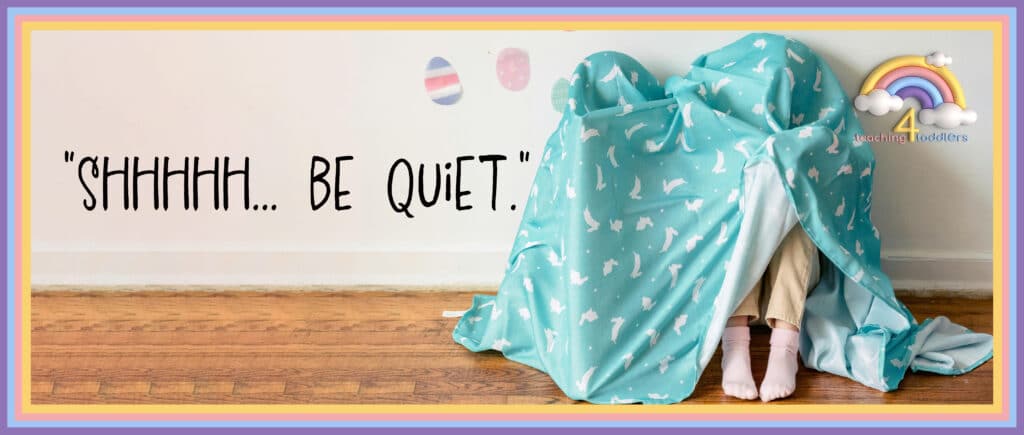
Cooperative games are a great example of social play. Toddlers learn that cooperation helps achieve the goal more effectively. This will assist in the toddlers social development and their desire to work with other toddlers rather than alone
Game Examples:
- Treasure Hunt: this was one of our favourites. We created all sorts of variations. Our daughter’s favourite was ‘Monster Hunt’. Create a map with picture clues leading to the hidden “treasure.” This game can be played indoors and outdoors. Set up a timer and tell the children that together they must explore the area to find the treasure.
If between them they collect all the treasure before the timer runs out they win the treasure prize. For this play scenario we bought several pirate costume kits. Our daughter and her friends would dress up and then we would direct them to the map.
Ask them where in the room they had seen the picture and then encourage them to find the treasure together, as the game went on we encouraged them to each look for a deeper are treasure piece to help them ‘collectively’ find the treasure before the timer ran out. - Block Building Challenge: toddlers revel in both building towers and knocking them down. This simple game involves asking the toddlers to work together to build a specific structure out of the blocks.
Keep it simple. A tall tower to start with. Then a house. Then get a bit more creative. A house with a swimming pool for example. Keep in mind throughout your toddler play sessions that toddlers minds are creatively amazing.
Tell the toddler that two bricks laid side by side represent a swimming tool and they will embrace it just as effectively as if you had drawn a swimming tool on card.
Implementation Steps:
To get the most out of these examples of cooperative game social play sessions we found the following tips useful:
- Explain the Rules: Clearly explaining the rules of the game helps the toddlers to focus on what they will do. Talk them
- Through the game’s objective and rules. Explain to the toddlers the importance of talking them through why teamwork and cooperation help them complete the goal.
- Divide Tasks: Depending on the game, assign roles or tasks to each toddler. Keep the tasks simple. It’s critical that each toddler has an assigned task, even where they duplicate each other. Two toddlers tasked with building the walls of an imaginary house with blocks. Whilst the other one lays the floor tiles or lays out the blocks for the garden. Each toddler should have a part to play in achieving the common goal.
- Encourage Communication: Prompt the toddlers to discuss their strategies and ideas with you and with each other. This will encourage them to think through what they are doing. It will also help them focus and be more engaged in the activity.
- Celebrate Collective Achievement: Once the objective is met, celebrate the achievement as a group effort. Tell the toddlers how amazing they’ve have done working together. Toddlers, especially once they reach late two years old to early three years old, soak up praise.
Outdoor Group Activity Play
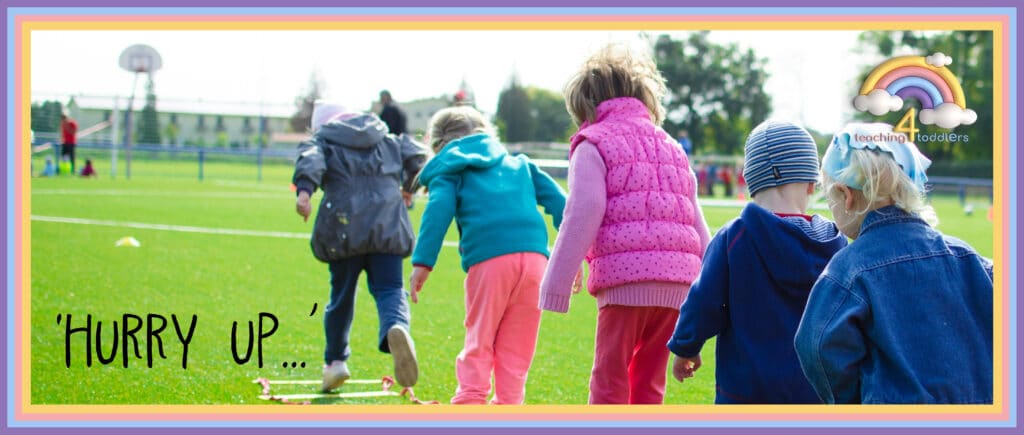
When the weather is good take the opportunity to set up outdoor social play sessions. Parents and toddlers will enjoy this constructive outdoor time.
Below are some examples that we found worked well.
- Tag. Our daughter and her friends lived to play tag. A toddler needs other children to play tag so it supports their social engagement. At first you may think that it’s too competitive. Try it out, you’ll see that the toddlers love to chase just as much as they love to be chased.
- Nature Scavenger Hunts: this is essentially outdoor ‘treasure hunt’. Create a list of natural items for children to find in a park or garden as a team. Draw a map of where to find the objects that includes pictures of the objects.
Implementation Steps:
- Organize Teams: Form teams in a way that encourages inclusivity and balance.
- Set Clear Objectives: Explain the activity’s goals and rules, focusing on the team aspect.
- Facilitate Interaction: During the activity, encourage teams to strategize and communicate effectively.
- Reflect on Teamwork: After the activity, discuss what went well and how teamwork contributed to the experience.
Social Play Art and Crafts
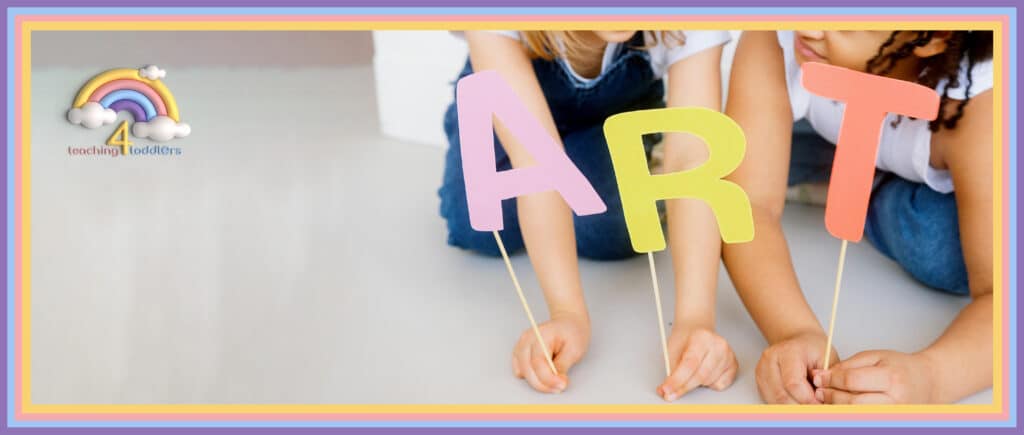
A large piece of paper can go a long way! You can create a large social play canvas by sellotaping together individual A3 sheets of paper or card
Project Ideas:
- Large Mural Painting: Set up a large canvas where children can contribute to a collective art piece.
- Group Collage: Provide magazines, scissors, glue, and a large poster board for children to create a themed collage together.
Implementation Steps:
- Choose a Theme: Select a theme for the project that resonates with the children or ties back to a learning objective.
- Distribute Materials: Ensure there are enough materials for all children to participate simultaneously.
- Encourage Collaboration: While children work, encourage them to share ideas and materials, discussing how their individual contributions fit into the larger project.
- Display the Finished Work: Showcase the completed project in a shared space, celebrating the collective creative effort.
Social Play Music and Dance
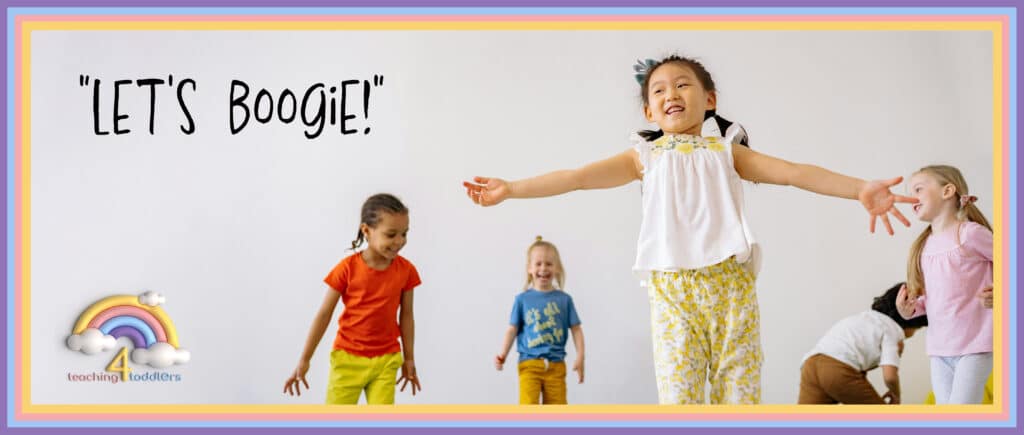
Activity Ideas:
- Circle Dances: Teach simple dances that require children to hold hands or perform actions in a circle.
- Homemade Band: Use simple instruments or homemade items (e.g., pots and spoons, shakers) to create music together.
Implementation Steps:
- Select Simple Songs: Choose songs with repetitive patterns or easy dances that children can follow.
- Distribute Instruments: If using instruments you must start by making sure that each toddler has one, or rotate them so everyone gets a turn.
- Lead the Activity: musical play will require a level of directed learning support. Start by leading the song or dance, gradually encouraging children to take turns leading.
- Encourage Expression: Promote individual musical or dance expressions within the group activity. Celebrate creativity and participation by telling the toddlers how well they are doing.
Each of these activities not only enhances social play but also builds a foundation for key skills in communication, cooperation, and creative expression.
By thoughtfully implementing the examples above, parents and educators can create positive, and fun, environments that promote the social and developmental growth of toddlers.
Guiding Social Play Interactions
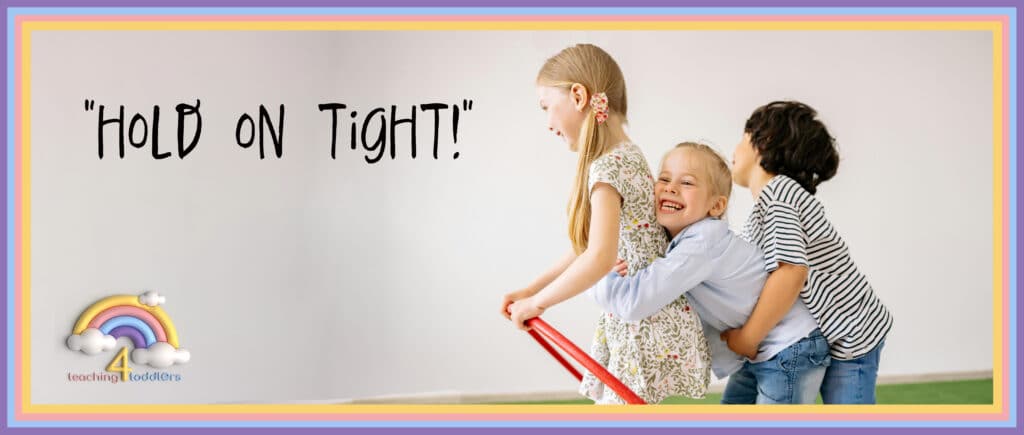
We’ve emphasised several times in this guide the importance of directing the social play. Our own experience was that social play requires active parent participation to achieve the benefits it can provide.
Keep the following points in mind when you plan out, or engage in, your toddlers social play sessions.
- Positive Reinforcement: Acknowledge and praise positive social interactions by the toddlers. For example sharing, cooperation, and kindness. Positive reinforcement encourages toddlers to continue engaging in socially positive behaviours.
- Conflict Resolution: Teach the toddlers basic conflict resolution skills and guide them through the process when disagreements arise. Helping children navigate conflicts in a constructive way is crucial for developing healthy social skills.
- Facilitation, Not Domination: Guide social interactions with a light touch. Step in when necessary to facilitate or resolve issues, but otherwise allow toddlers to lead their play whenever possible. This approach helps the toddlers learn to manage their interactions independently.
- Encouraging Reluctant Participants: For shy or reluctant toddlers, gently encourage their participation.
By implementing these tips, parents, educators, and caregivers can create enriching environments that not only encourage social play but also support the overall development of a toddler.
Throughout this article, we have explored the dynamic world of social play in early childhood, highlighting its invaluable role in a child’s holistic development. From fostering cognitive and emotional growth to enhancing language skills and physical development, the benefits of social play are profound and far-reaching.
We delved into a variety of social play activities, including dramatic/role play, cooperative games, outdoor group activities, art and craft projects, and music and dance, providing step-by-step guidance on how to implement these enriching experiences in early childhood settings.
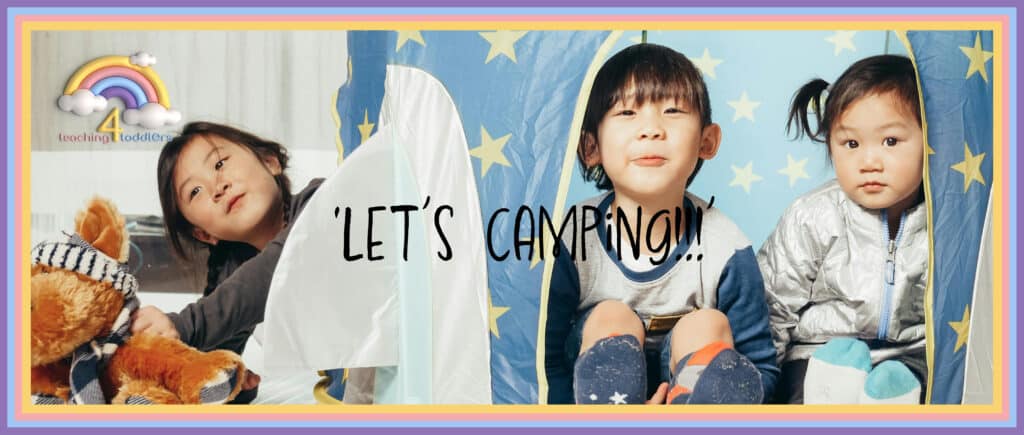
Key to facilitating these activities is the thoughtful design of play spaces that encourage interaction, the selection of materials that promote shared play, the fostering of an inclusive culture that welcomes all children, and the gentle guidance of social interactions to ensure they remain positive and constructive.
By incorporating these elements, parents, educators, and caregivers can create environments that not only support social play but also nurture the development of essential life skills.
The importance of actively promoting and facilitating social play cannot be overstated. In a world where digital distractions are ever-present, and structured schedules often dominate children’s lives, ensuring that there is ample opportunity for spontaneous, interactive play is crucial.
Social play offers a unique avenue for children to explore their identities, understand others, and develop the social and emotional competencies that will serve them throughout their lives.
We encourage parents and educators to draw upon the examples and tips provided in this article to create vibrant, engaging play opportunities that invite children to connect, share, and grow together.
By prioritizing social play as part of our toddler’s fun learning, we invest in the future of our children, equipping them with the skills, empathy, and creativity needed to thrive in an increasingly complex and interconnected world.
Let us commit to fostering these playful experiences, recognizing them as essential to the well-being and development of every child.


